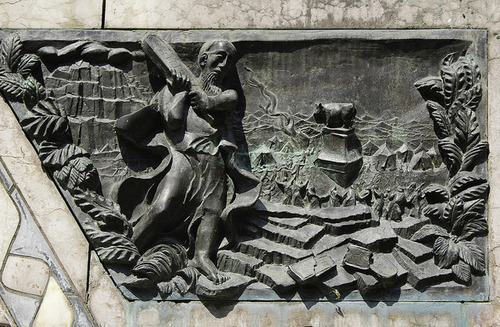
HOMILY for Thu in Week 4 of Lent
Exodus 32:7-14; Ps 105; John 5:31-47
Today’s Gospel continues a long discourse between Jesus and the Jews. Let’s recap. Jesus healed a sick man on the Sabbath, which angered the Jews. But Jesus argues that just as God doesn’t stop working on the Sabbath, neither does he. The implication is that God is the source of all life and being, and just as God continues to sustain all life even on the Sabbath, so, too, Jesus is doing this work on earth, bringing healing and new life to the sick man, even on the Sabbath. But this response angers the Jews so much that they want to kill Jesus because he’s made himself equal to God; it’s blasphemy.
Jesus’ response is to say that he is perfectly obedient to the Father, doing what the Father does. Jesus is, as St Paul would say, “the image of the unseen God” (Col 1:15). So, the Son is, as it were, the mirror image of the Father so that we can see on earth in Christ’s works what God the Father in heaven is doing invisibly. Jesus, thus, lays down a challenge for the Jews: to believe his word. Thus we heard yesterday: “Truly, truly, I say to you, he who hears my word and believes him who sent me, has eternal life… ” (Jn 5:24). So, one’s judgement on whether or not to believe Jesus and accept his Word also judges oneself, in terms of how one will live and end up, because if we follow him and obey him, we will have forgiveness, grace, and a share in the divine life, but without Christ there is only sin and death; nothingness.
Today’s Gospel, then, has Jesus, as it were, giving proof for the authority for his words. Why should the Jews believe him? Because “these very works which I am doing bear witness that the Father has sent me” (Jn 5:36). In other words, the works of healing, of giving new life, are a sign, a proof. They show that Jesus is Jesus is who he says he is, namely, equal to God the Father, because only God can give life and heal and work on the Sabbath. So, the Father bears witness to the authority and trustworthiness of Jesus’ words. And, Jesus adds, John the Baptist, who stands for the prophets, and also Moses, who stands for the Law, both also testified to Christ and his coming.
Jesus also speaks of “the works which the Father has granted me to accomplish” (Jn 5:36), and this, I think, is a reference to Jesus’ passion, death, and resurrection. The resurrection, of course, is the greatest work of the Father that bears witness to the Son, to Jesus being who he says he is, namely God. And this is where we, the Church, come in. You and I are being called today to make an act of faith, and so, to bear witness to Christ too.
For as John the Baptist and Moses are the witnesses from history who pointed to the truth of who Jesus is, so we are witnesses from the future (in relation to that moment in John’s Gospel when Jesus spoke to the Jews) who point to the truth of Christ, the Risen One. So, together with the just and righteous men of God’s People, Israel, the saints of God’s People, the Church, all point to Christ and converge on him. He is the One whom we worship.
However, the golden calf is always present as a temptation. It’s a temptation against faith. So, every time we’re called to be witnesses to the Risen Lord, to Jesus as Lord and God, to the truth of God’s eternal Word, we might well feel the tug of this temptation. But it’s not a temptation to doubt but idolatry. As Pope Francis said: “In place of faith in God, it seems better to worship an idol, into whose face we can look directly and whose origin we know, because it is the work of our own hands. Before an idol, there is no risk that we will be called to abandon our security… Those who choose not to put their trust in God must hear the din of countless idols crying out: "Put your trust in me!” Faith, tied as it is to conversion, is the opposite of idolatry; it breaks with idols to turn to the living God in a personal encounter" (Lumen Fidei, 13).
And this, I think, is what we’re invited to whenever we feel the tug against faith. To seek the living God in a personal encounter. For isn’t that what we do when we come to Mass? And so I invite you, too, to come tonight to the Eucharistic Healing Service. As Pope Francis says: “Believing means entrusting oneself to a merciful love which always accepts and pardons, which sustains and directs our lives, and which shows its power by its ability to make straight the crooked lines of our history”. Come tonight and let us experience this in the Sacrament of Reconciliation; as we see God’s works of mercy and love.
 fadingstarfishstudent5779t6 liked this
fadingstarfishstudent5779t6 liked this lawrenceop posted this